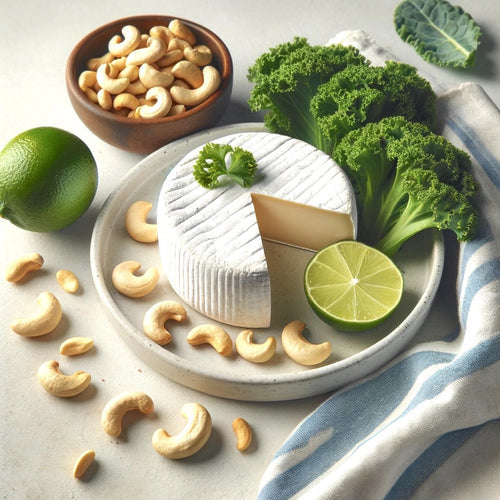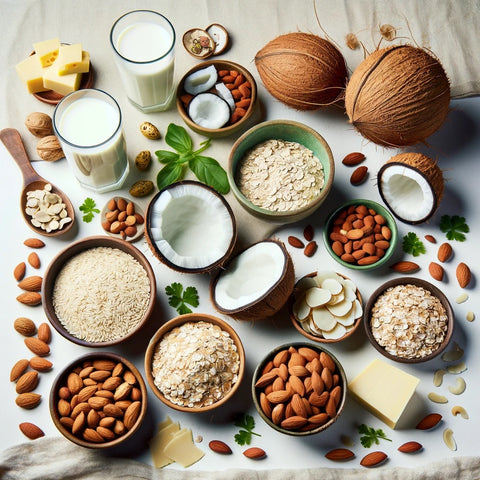
A Plant-Based Delight: What is Vegan Cheese Made of?
Share
In the ever-evolving landscape of sustainable living, vegan cheese has emerged as a beacon for those navigating the seas of health-conscious, ethical, and environmentally friendly choices. Gone are the days when dairy-free meant flavor-free. Today's vegan cheese market boasts an array of options that rival traditional dairy in both taste and texture. But what magic lies behind these innovative creations? Let’s peel back the rind and discover what vegan cheese is made of, how it’s crafted, and why it might just be the next great addition to your plant-based pantry.
The Basics of Vegan Cheese
At its core, healthy vegan cheese is a symphony of plant-based ingredients, each selected for their unique properties that mimic the creamy, tangy, and savory characteristics of dairy cheese. From the soft, spreadable cashew bries to the firm, sliceable blocks made from coconut oil, vegan cheese can satisfy a wide range of palates and dietary preferences. But it's not just about nuts and oils; the vegan cheese palette is vast, incorporating seeds, soy, root vegetables, and an array of natural flavorings and nutritional enhancements.

Key Ingredients in Detail
Nuts: The Creamy Base
Cashews and almonds are the stars in many vegan cheese recipes, beloved for their rich, creamy textures and subtle flavors. Soaked and blended, they form the perfect foundation for everything from ricotta to cheddar-style spreads. Our Pharmer cheese base is made from almonds.
Seeds: A Nutritional Powerhouse
Sunflower and pumpkin seeds offer a lower-fat option for cheese making, with the added benefits of vitamins, minerals, and essential fatty acids. Their neutral taste makes them ideal for heavily flavored cheeses like herbed feta or pepper jack.
Soy: Versatile and Protein-Rich
Tofu and soy milk bring protein to the vegan cheese board, creating textures that range from soft and spreadable to firm and sliceable. Soy's mild flavor makes it a chameleon in the kitchen, easily adopting the bold tastes of bacterial cultures or smoke.
Root Vegetables: Nature's Color Palette
Potatoes and carrots lend their natural colors and sweetness to vegan cheese, contributing to the smooth texture and slight sweetness found in some varieties. These vegetables are also a great source of vitamins and fiber.
Coconut Oil: The Secret to Solidity
For those looking for a melt-in-your-mouth experience, coconut oil is the go-to. Its saturated fat content helps vegan cheese achieve the solid, yet creamy consistency that mimics dairy cheese so well, especially in mozzarella and provolone.
Flavor and Texture Enhancers
Nutritional yeast, agar-agar, and tapioca are the unsung heroes of the vegan cheese world, adding depth of flavor, stretchiness, and the perfect melt. Nutritional yeast brings a cheesy, umami flavor, while agar-agar and tapioca lend a firmness and elasticity reminiscent of dairy cheese.
The Process of Making Vegan Cheese
The alchemy of turning these plant-based ingredients into cheese varies from simple, no-cook recipes to complex, aged varieties that require fermentation. The basic process involves blending the primary ingredients into a smooth paste, adding flavorings, and then using agents like agar-agar to set the cheese. More sophisticated methods involve culturing the cheese with probiotics, aging it to develop deeper flavors, and even incorporating molds for that authentic blue cheese experience.
Health Benefits and Nutritional Considerations
Vegan cheese is not only a delicious alternative for those avoiding dairy, but it also boasts several health benefits. Lower in saturated fat and cholesterol, vegan cheese is heart health friendly and often enriched with essential nutrients like vitamin B12 and calcium. However, it's important to read labels, as not all vegan cheeses are created equal in terms of nutritional value. Look for products or recipes that prioritize whole foods and minimal additives for the best health benefits.
Environmental and Ethical Considerations
Choosing vegan cheese supports a more sustainable and ethical food system. Plant-based cheese production requires significantly less water and land, and generates lower greenhouse gas emissions than dairy farming. Moreover, it avoids the animal welfare concerns associated with the dairy industry, making vegan cheese a choice that's kind to both the planet and its inhabitants. These are principles associated with One Health. It's also fun to try new things!
The world of vegan cheese is rich and varied, offering something for everyone—from the health-conscious gourmet to the environmentally aware consumer. By understanding what vegan cheese is made of, we can appreciate the innovation and care that goes into each slice and spread. As we continue to seek out sustainable and ethical food choices, vegan cheese stands out as a delicious and responsible option. Add it to your favorite gluten free bread and enjoy!
Ready to explore the diverse world of vegan cheese? Start by experimenting with making your own at home, or navigate the grocery store by seeking out organic, artisanal brands that align with your values. There’s a whole universe of flavors and textures waiting to be discovered, and every choice you make brings us one step closer to a more sustainable and compassionate world. Follow us for more tips, recipes, and insights into living a plant-based life joy.
